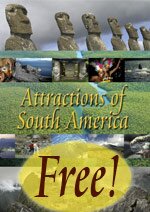Ecuador: Language
The official language of Ecuador is Spanish, though at least twenty other first languages are spoken by native Ecuadorians, including nine dialects of Quichua and a further eight indigenous languages of the Oriente. English and some other European languages are spoken in tourist centers and well-to-do hotels and agencies, but otherwise you'll need to know a bit of Spanish.
It's an easy language to pick up, especially in Ecuador - or rather in the Ecuadorian sierra - whose inhabitants are known for speaking fairly slowly and clearly, usually pronouncing all the consonants of a word. On the coast, however, the task is made harder by a difficult accent that drops the letter "s" and trims down whole word endings, so that " arroz con pescado ", for example, becomes " arro' con pe'ca'o ". Many beginners spend a week or longer getting to grips with the basics at one of Quito's numerous language schools, most of which offer great-value one-to-one lessons for about $5 per hour. Popular alternatives to Quito include the small mountain town of Baños and the colonial city of Cuenca, both home to a number of language schools.
Those who already speak Spanish will have no trouble adjusting to the way it's spoken in Ecuador, which pretty much conforms to standard textbook Castilian, spoken without the lisped "c" and "z". That said, it does, of course, have its own idiomatic peculiarities, one of which is the compulsive use of the word " nomás " ("just" or "only"), which seems to crop up all over the place (" sigua nomás " for "go ahead", or " siéntate nomás " for "sit down", to give just a couple of examples).
Something else that sets Ecuadorian Spanish apart from Iberian Spanish are the many indigenous words that pepper its vocabulary, particularly Quichua words such as guagua (baby), mate (herbal infusion), pampa (plain), soroche (altitude sickness) and minga (communal labor). Ecuador also readily borrows from English, resulting in a slew of words regarded with horror by Spaniards, such as chequear (to check), parquear (to park), rentar (to rent), sánduche (sandwich) and computador (computer). This somewhat flexible approach to their own language makes Ecuadorians more than willing to accommodate a foreigner's attempts to speak Spanish, which are invariably rewarded with smiles and compliments no matter how clumsy or inaccurate.
Source: TravelNow Destination Guides
Free Spanish Lessons

Sentence Building
Advanced Lesson
Numbers
Daily Objects
Do you want to make the most out of your South America travel adventure? Our number one tip is to learn some Spanish. Why don't you start today! Have some fun with our FREE online Spanish lessons!
0 Comments
Have something to say about this article?
Feel free to share your views, travel experiences, tips and tricks, etc... about this article. All comments are moderated and do not appear instantly. Please keep your comment relevant to this article. You will not see a confirmation message after submitting your comment but rest assured, we got it.
© Copyright Rough Guides Ltd as trustee for its authors. Published by Rough Guides. All rights reserved.
The Rough Guides name is a trademark of Rough Guides Ltd.












